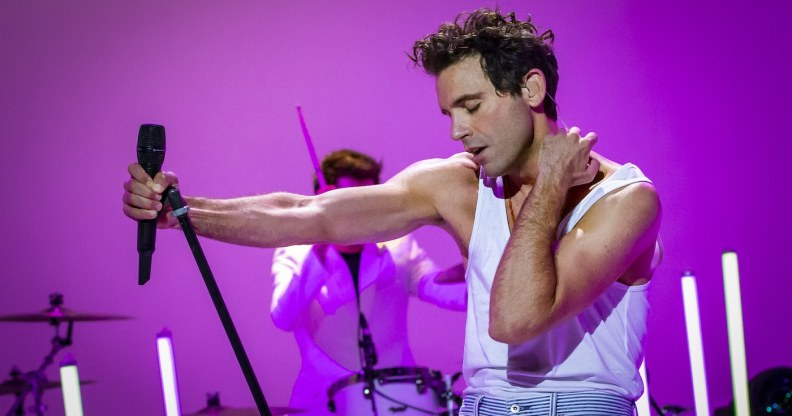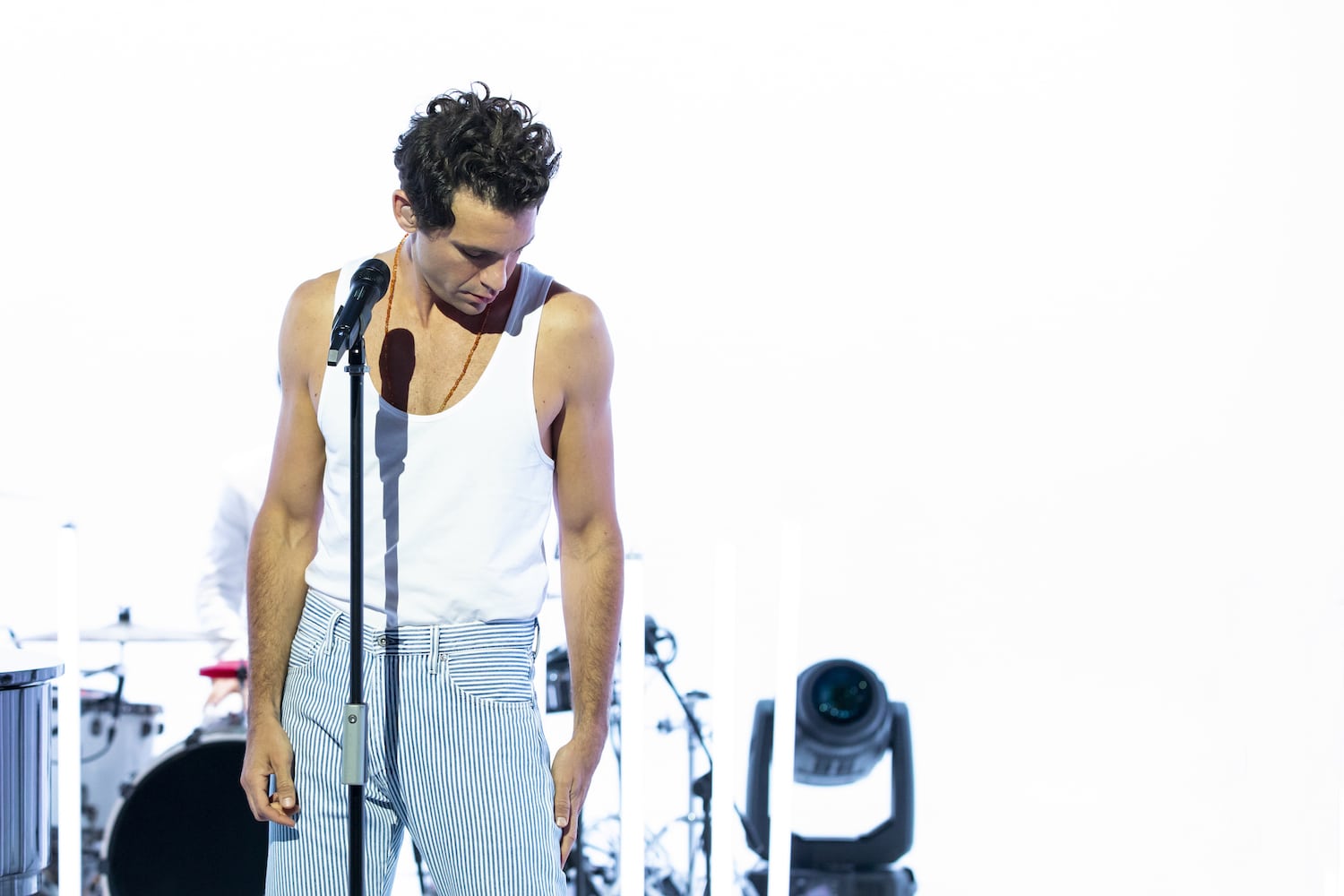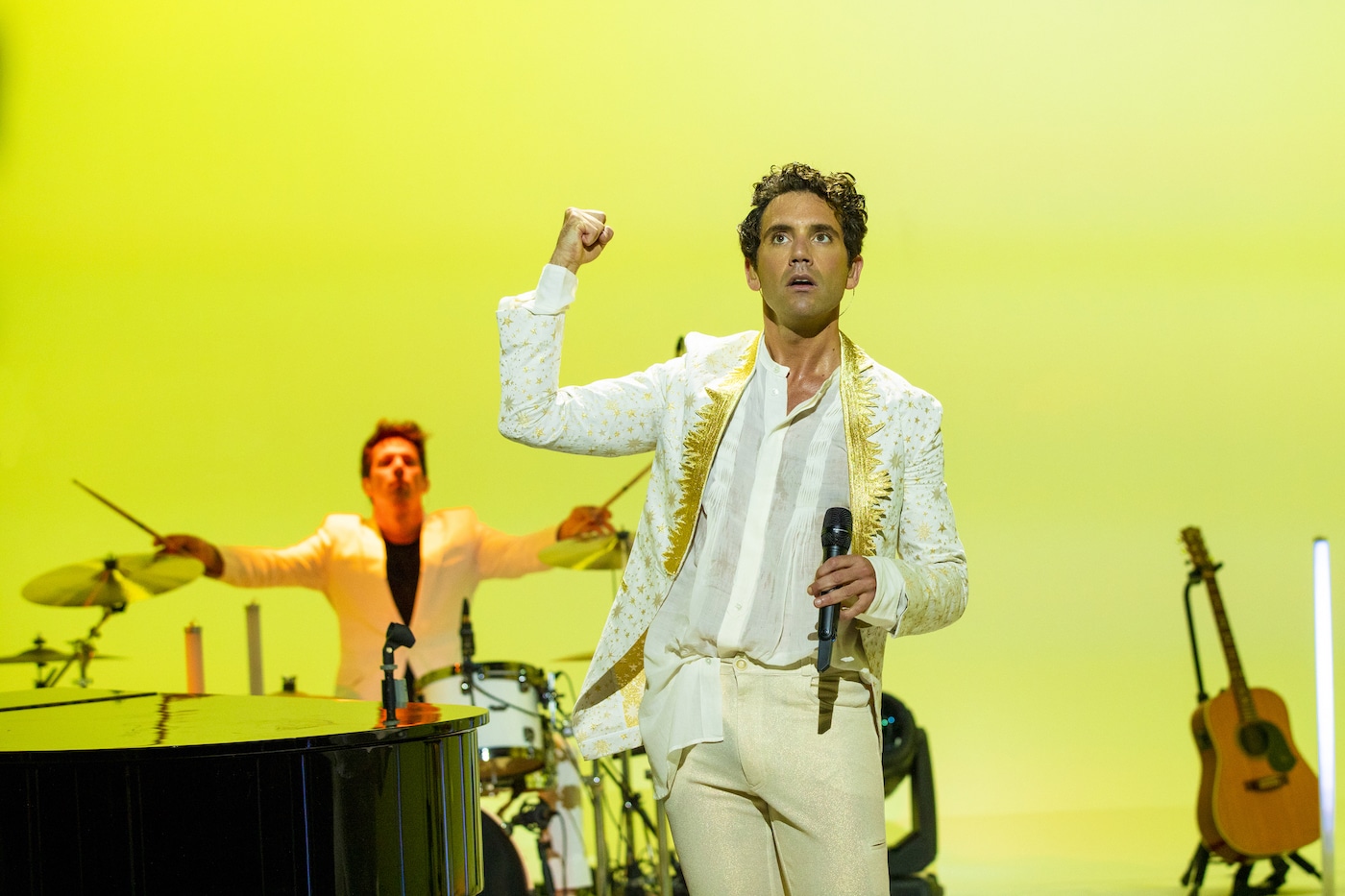Pop icon Mika felt ‘exploited’ by journalists hounding him to come out before he’d even told his mum

Mika performing in his live-streamed concert, which was created in partnership with Indeed. (Provided)
Gay pop icon Mika burst onto the music scene with his chart-topping single “Grace Kelly” in 2007 – but it wasn’t long before his work took a back seat in interviews, with journalists probing him on his sexuality instead.
While he had an undeniably queer sensibility, Mika tended to dodge questions about whether he was gay in early interviews. Many LGBT+ people will remember that era for its feverish, clamouring obsession with sexuality. It didn’t matter if somebody wasn’t ready to come out, or if they weren’t comfortable disclosing how they identified. What mattered was the headline, the salacious quote, the irrepressible need for confirmation.
Mika came out as gay in 2012, a full five years after he skyrocketed to the top of the UK charts. But the spectre of those interviews still bothers him to this day.
“Sexuality, sexualised themes and gender themes were so present in music, and have always been so intrinsically a part of my writing,” Mika tells PinkNews.
“The interview part of it felt like a kind of exploitation in the wrong way, and it very quickly became this kind of searching for a defined label, or searching for a ‘scoop’ confirmation in the most cynical sense. This being at a point in my life where I hadn’t even come out to my own mum – why am I going to do this with a journalist I’ve never met when I hadn’t come out to my mum?
“Looking back, I was really pressured a lot about labelling myself. I used to feel bad. I now realise that, actually, the journalists that put so much pressure on me should feel bad. It’s not healthy.”
Mika now believes that things “come in phases” and people should be allowed to “follow their natural course” while exploring their sexuality. He did that in his music.
“I made music to express parts of me and my identity, and also my sexuality, before I had the words or the capacity to do so in normal daily life. And that’s also why I make music – to express what I find more difficult to express or what I need time to express. That’s also why people listen to music. We shouldn’t discount that, it doesn’t mean that it’s not good, it’s great. That’s a really necessary thing.”
Coming to terms with his sexuality ultimately “took time”, and he was well into his late 20s before he came out as gay.

When he did eventually come out – to international headlines – it was a peculiar experience for the singer.
“It felt like I had already [come out] in my music,” Mika explains. “I had never pretended to be anything I wasn’t, and I was very grateful that life had allowed me that privilege.
“It allowed me to move on to the second part of a more open, honest relationship with more empathy with my own family. And that was the most important thing – to let that evolve, to let that take its course.”
Mika refused to let record label bosses ‘reorientate’ his kaleidoscopic imagery early on
The music industry is a very different beast today to what it was in 2007. Today, some artists can be visibly, openly queer without it really causing much of a stir.
But many LGBT+ musicians have opened up about the pressures they’ve faced in their careers to appear straight or cis in an effort to appeal to a wider audience. Mika hasn’t faced overt homophobia from record label bosses, but he did face some early challenges to his wild, colourful aesthetic.
“At the beginning of my career, it was more present, especially in certain territories more than others,” he says. “To be honest I got kind of lucky with the fact that my whole visual world was something that was really homespun – I mean, I was making my own clothes, and I do my own drawings and so it’s not like you could just replace a part of it.”
Mika recounts one meeting with his record label early on where they announced their plans to hire a graphic designer and a stylist to work with him.
“I was like, ‘Are you crazy? I do it at home with my sister! That’s why you signed me – you’re not allowed to change that. No way!’ ‘OK, we’re going to find you a stylist.’ ‘Are you out of your f**king mind? I do that with my mum!’ I certainly wasn’t going to let someone else tell me how to reorientate my music – ever.”
Mika never bowed to this pressure, and he happily explored sexuality and gender norms in his own way on his debut album Life in Cartoon Motion – themes he continues to explore today, but in a much more upfront way.
In 2019, he released his fifth studio album My Name is Michael Holbrook, which featured the single “Sanremo”. The music video, shot in black and white, follows a married man in an era when homosexuality was still criminalised. Making the video was “a poetic way of calling certain things into question,” he says.
“Homosexuality is still criminalised in many, many countries around the world. It is still not embraced enough by the church in many western countries, and I think it’s good to talk about that to put things in perspective but also to highlight the disparities because we need to address that, we need to remember that.”
Such a discussion takes on a special meaning during Pride Month, which takes place each year in June. Mika remembers seeing Pride parades taking place before he had come out. Seeing such spectacles of queer joy gave him hope.

“At first, it was something that I coyly observed from the wings as a kid and as a young teenager, but it was really important to know it was there, even if I didn’t have the courage or I wasn’t at that place in my life where I could feel like I could just step out and join in. But I knew it was there, and knowing that it’s there is so f**king important. Knowing that there’s a version of life out there where it’s OK to be proud, you don’t have to be afraid, you don’t have to be ashamed. And then progressively as life went on, it took on a different importance in my life. It became something that was part of my life.
“It’s about cultivating that pride in yourself and demanding a certain kind of unapologetic consideration. And that’s something that is super important.”
Mika is marking Pride Month this year with a special live-streamed concert in partnership with Indeed. The performance will be streamed on his YouTube channel on Thursday (24 June), with proceeds going to Lady Gaga’s Born This Way Foundation. Indeed is also donating a one-off $20,000 sum to the charity, and the company will also donate one dollar for every stream of the Soundtrack of Empathy concert up to a maximum of $20,000.
“This is happening because of Pride. I think that’s really important to make very clear,” Mika explains. “I love the way Indeed as a company approached this. They weren’t just asking to do a standard partnership, what they came to me asking was, ‘Can you make a piece that is dedicated to Pride and dedicated to this concept of empathy, and ask the question in your piece, what is empathy, what is it for, and what place does empathy have in the month of Pride?’ I thought that was such a sensitive question.
“I think partnerships with companies are only good if they have the right starting point, and if they’re allowed to also be sensitive and poetic because we’re dealing with something that relates to people and is really important to our community. I accepted the challenge willingly, because the question was the right one.”
There are some things in the concert that are “really beautiful,” Mika teases, explaining that it was shot in a “kind of endless white studio” that was “filed with colour”. It’s also “not just a concert,” he explains, revealing that it will also feature interviews with LGBT+ people.
“I love contextualising my music with these people’s stories from different backgrounds,” he says.
“One of the people we spoke to, who says it so beautifully, says, ‘Pride is a reminder to live without shame.’ I thought, that’s so great, because I came out really late, and for me now as an adult, Pride is a reminder to live without shame. I empathise with that completely.”
Mika’s livestream will debut on his YouTube channel on 24 June at 7pm BST.

